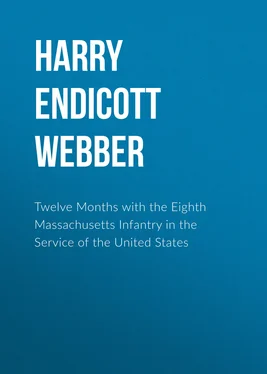Harry Endicott Webber - Twelve Months with the Eighth Massachusetts Infantry in the Service of the United States
Здесь есть возможность читать онлайн «Harry Endicott Webber - Twelve Months with the Eighth Massachusetts Infantry in the Service of the United States» — ознакомительный отрывок электронной книги совершенно бесплатно, а после прочтения отрывка купить полную версию. В некоторых случаях можно слушать аудио, скачать через торрент в формате fb2 и присутствует краткое содержание. Жанр: foreign_prose, История, foreign_edu, foreign_antique, на английском языке. Описание произведения, (предисловие) а так же отзывы посетителей доступны на портале библиотеки ЛибКат.
- Название:Twelve Months with the Eighth Massachusetts Infantry in the Service of the United States
- Автор:
- Жанр:
- Год:неизвестен
- ISBN:нет данных
- Рейтинг книги:5 / 5. Голосов: 1
-
Избранное:Добавить в избранное
- Отзывы:
-
Ваша оценка:
- 100
- 1
- 2
- 3
- 4
- 5
Twelve Months with the Eighth Massachusetts Infantry in the Service of the United States: краткое содержание, описание и аннотация
Предлагаем к чтению аннотацию, описание, краткое содержание или предисловие (зависит от того, что написал сам автор книги «Twelve Months with the Eighth Massachusetts Infantry in the Service of the United States»). Если вы не нашли необходимую информацию о книге — напишите в комментариях, мы постараемся отыскать её.
Twelve Months with the Eighth Massachusetts Infantry in the Service of the United States — читать онлайн ознакомительный отрывок
Ниже представлен текст книги, разбитый по страницам. Система сохранения места последней прочитанной страницы, позволяет с удобством читать онлайн бесплатно книгу «Twelve Months with the Eighth Massachusetts Infantry in the Service of the United States», без необходимости каждый раз заново искать на чём Вы остановились. Поставьте закладку, и сможете в любой момент перейти на страницу, на которой закончили чтение.
Интервал:
Закладка:
The scope of this article will not admit of a detailed account of all that was done for the people and City of Matanzas during our stay there. It is probably sufficient to say that we cleaned and disinfected the city and established a system of sanitation so thorough that a recent traveler through the island told me that Matanzas was the cleanest and healthiest city in Cuba, and that there had been no case of yellow fever there since we left. To accomplish this a certain number of our officers and non-commissioned officers and men associated with the various city officials, who were, however, required to take the lead, the officers acting as advisers and assistants when necessary.
Matanzas was suffering at that time from the effects of the reconcentration ordered by General Weyler, and the population has been increased from about 25,000 to 40,000, chiefly refugees. As soon as it could be done these people were returned to their old homes, or provided with homes elsewhere. In the meantime, they, together with all other indigent poor, to the number of 19,373, were fed by the United States Government. Prior to this many—chiefly children—died of starvation, and many more would have followed but for the timely arrival of the troops.
Some idea of what was done by the Army for the people of Matanzas may be gathered from the vital statistics of the city. During the year 1897 there were 6,729 recorded deaths, and in 1898, 5,972, or an average of 6,350 or over 500 deaths per month. In April, 1899, the last report rendered before we left showed a total of 68 deaths, quite a perceptible decrease in four months. I have enlarged somewhat on this subject because the results of our efforts were so gratifying, and because the Eighth Massachusetts took an important part in this work, especially Chaplain George D. Sanders.
Another most useful and special service rendered by the Eighth was a settlement of the first strike ever inaugurated in Matanzas. Labor unions and strikes were unknown before American occupation, but it was not long before labor union delegates from the States arrived in Havana, and soon unions were formed and rumors of strikes reached Matanzas, to be followed later by two delegates who organized a union and started a strike for shorter hours and higher pay among the employees of the railway and the stevedores engaged in loading the annual sugar crop, then arriving in vast quantities. As a large number of the native workmen did not care to strike, those who did immediately began the kind of intimidation usually resorted to in this country, and several were assaulted and more threatened, and the situation became serious.
At this point the manager of the road appealed to me for protection and I sent two companies of the Eighth to the freight yards to see that protection was given. I gave no instructions but relied on the experience and good sense of the officers and men, and they ended the strike to my entire satisfaction. No doubt they can recall the circumstances, and the very effective measures resorted to.
That they were good and sufficient may be inferred from the fact that no one ever complained of them, except the two delegates, and they were told they could go to jail or leave town, which latter they did by the first available train, and peace and contentment prevailed thereafter to the end.
On the 20th of January commenced the festivities to celebrate the evacuation of Cuba by the Spaniards, and on February 22nd another fiesta was held in honor of General Maximo Gomez, at that time the idol of the Cubans. Upon both occasions the entire population thronged the streets and the greatest excitement prevailed. General Gomez remained in Matanzas three days, and with his departure the city settled down into its usual calm.
Thanks to the tact and excellent conduct of the troops, nothing occurred to disturb the festivities; the crowds were handled with great skill and with due regard to their susceptibilities and their first taste of personal liberty—not only as individuals but as a community. And to the very great honor of the troops it may be said that this was ever the rule in dealing with the residents of the city, no complaint of misconduct, public or private, having ever been made to me.
The Eighth Massachusetts was especially fortunate in gaining the good will of the Cubans, and when it left Matanzas was the recipient of a letter of enthusiastic commendation from the mayor of the city. A copy of the letter was sent to me, and the very complimentary expressions of the mayor were neither exaggerated nor unmerited. The regiment deserved a great deal from the people of Matanzas, and it was very gratifying to me to know that they appreciated your services.
I regret that in this brief sketch I have not been able to go more into detail concerning the duties, the trials and successful achievements of the Eighth Massachusetts during the Spanish War. It is sufficient for me to say as your brigade and division commander, that while we were together, a day rarely passed that I did not ride through your camp, turn out the guard and take a general look around, and on every Sunday make a careful inspection, and it gives me the greatest pleasure to say that in point of efficiency the regiment had few equals, and no superiors, among the volunteer regiments which came under my observation.
Proper esprit de corps and a high sense of duty pervaded the regiment, due in great measure to the excellent example of Colonel Pew and his field officers, Lieutenant-Colonels Bailey and Stopford and Majors Eldredge and Graves. During the summer of 1907 I visited the regiment in camp at South Framingham and was glad to note that the instruction and the experience of the war had not been forgotten.
In conclusion I beg to remind you that while all military efforts should be directed towards the preparation of soldiers for the great tests of the battlefield, because so much may depend on the result, there are other tests which if successfully borne, entitle soldiers to as much credit as good conduct under fire, although they may not bring them as much renown.
Among disciplined soldiers it is the exception to find one who does not behave well under fire, but it by no means follows that the bravest will not falter in their duty if beset in a sedentary camp with plague, pestilence or famine. It is not as much of a strain on the nerves to see a soldier killed in battle as to see him die of an epidemic disease, nor do I believe it is as hard for the soldier. When a soldier goes under fire, he is facing the very contingency for which he enlisted and for which he has been trained. He knows he may be shot and wounded or killed, but his duty lies unequivocally before him and appeals directly to his pride and to his manhood in a way disease can never do. Who will say then that the men who fought the battle of San Juan deserved more credit than those who died from typhoid fever while acting as volunteer nurses to their comrades or in the discharge of other duties, when by getting a furlough or running away they could have avoided all risk. The excitement of battle and the example of brave men have made a hero of many a man who but for that would have run away.
But in a typhoid fever camp death lurks everywhere and there is no stimulating excitement to strengthen those who have to face it.
Therefore the highest honors should not be given solely to those soldiers who are so fortunate as to do their duty under fire, but to those as well who do their duty where-ever they may be, regardless of consequences, and in all the circumstances which may attend them.
Do not therefore complain, as I have heard some of you do, or tinge your recollections of the war with regret, because you did not take part in the only battle that was fought, but, hoping for better luck next time, find supreme satisfaction in the reflection that you did your whole duty in places where death was quite as imminent as on San Juan Hill, and that no other regiment, regular or volunteer, could have done more.
Читать дальшеИнтервал:
Закладка:
Похожие книги на «Twelve Months with the Eighth Massachusetts Infantry in the Service of the United States»
Представляем Вашему вниманию похожие книги на «Twelve Months with the Eighth Massachusetts Infantry in the Service of the United States» списком для выбора. Мы отобрали схожую по названию и смыслу литературу в надежде предоставить читателям больше вариантов отыскать новые, интересные, ещё непрочитанные произведения.
Обсуждение, отзывы о книге «Twelve Months with the Eighth Massachusetts Infantry in the Service of the United States» и просто собственные мнения читателей. Оставьте ваши комментарии, напишите, что Вы думаете о произведении, его смысле или главных героях. Укажите что конкретно понравилось, а что нет, и почему Вы так считаете.












